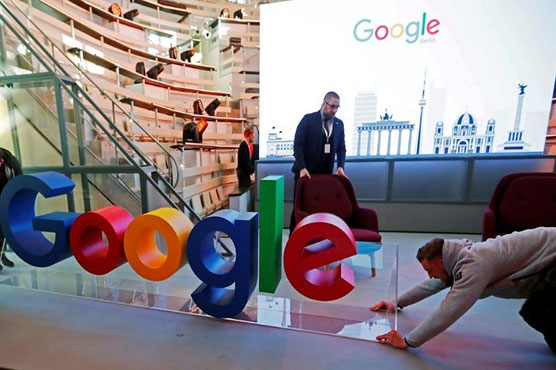Explainer: What Google, Facebook could face in U.S. antitrust probe

Small toy figures are seen in front of Google logo in this illustration picture.
(Reuters) - The U.S. Department of Justice is investigating whether big technology companies are engaged in anticompetitive behavior, addressing a rising tide of criticism they have become too powerful to the detriment of consumers.
The Justice Department has said it will investigate “whether and how” online platforms in “search, social media, and some retail services online” are engaging in behavior that stifles competition and harms consumers.
While the Justice Department did not name any targets in announcing the probe on Tuesday, sources have indicated Alphabet Inc’s Google, social media giant Facebook Inc, online retailer Amazon.com Inc and possibly Apple Inc will likely be reviewed.
Here’s what regulators could focus on at the big technology companies:
The Justice Department is expected to focus on allegations Google harms competitors by favoring its own products in search results, though sources told Reuters the department will look at all of Google’s businesses, including advertising and its Android mobile platform.
Google has said it is transparent in how it promotes its own services and that changes to its search algorithms are made with consumers in mind.
Google has also faced criticism for allegedly abusing its dominance in advertising. Platforms that want to host advertising on their own sites often have to go through Google or Facebook to do so.
European antitrust regulators fined Google $5 billion in 2018 and ordered it to stop using its Android platform to block competitors. The European Union alleged that Google’s illegal actions include forcing device manufacturers, who use the Android platform on their phones, to pre-install Google apps on devices, blocking out competitors’ apps.
Google said in a blog post that it would “do more to ensure” that Android users know about other options they can download.
Republican U.S. lawmakers have also charged that Google and other tech companies are biased against conservative voices. Republican Senator Ted Cruz said in April that “using the powers of monopoly to censor political speech ... raises real antitrust issues.”
Karan Bhatia, Google’s vice president of government affairs and public policy, denied those claims in a Fox News op-ed and Democrats say there is no evidence to back the charges.
Facebook has faced criticism it is a monopoly, with over 2.4 billion monthly users as of April this year, about a third of the world’s population.
In 2012, Facebook bought social media app Instagram, one of its competitors. In 2014, it bought another of its competitors, messaging platform WhatsApp.
In a U.S. House of Representatives hearing last week, Facebook’s head of global policy development Matt Perault stressed Facebook’s competitors as evidence it is not a monopoly.
Critics have called for Facebook to sell off WhatsApp and Instagram.
The company has also been criticized for copying the “story” function that competitor Snapchat is known for, implementing the option to share a photo temporarily on both Facebook and Instagram.
Facebook did not immediately respond to a request for comment.
AMAZON
In the United States, half of all online shopping transactions happen on Amazon, giving the e-commerce company sway over merchants that use its platforms. Amazon has been criticized for its power over third-party sellers on its website, who must pay for advertising to compete against first-party and private label sales by Amazon’s own brands.
Amazon has also faced criticism that its low prices have hurt brick-and-mortar retailers, including some who have closed because they could not compete.
But in a 2018 letter to shareholders, Chief Executive Officer Jeff Bezos said “Amazon remains a small player in global retail” because most commerce still happens offline.
Amazon reached an agreement with German antitrust authorities last week to change its agreement with third-party merchants following an investigation of complaints from the sellers that its terms were unfair.
European Union regulators are investigating Amazon’s data agreements with sellers. The European Commission has been seeking feedback about Amazon’s dual role as a marketplace for merchants and as a competitor in that marketplace.
U.S. Treasury Secretary Steven Mnuchin said in an interview with CNBC on Wednesday there was “no question” that Amazon limits competition and has harmed U.S. retailers.
In response, an Amazon spokesman said small businesses are “thriving with Amazon” and that independent sellers make up more than 58% of its gross merchandise sales.
APPLE
Last month, app developers Donald R. Cameron and Illinois Pure Sweat Basketball alleged in federal court that Apple’s policy of only allowing the downloading of iPhone apps through its official App Store is anticompetitive. Apple mandates developers to price apps in tiers ending in 99 cents and takes up to a 30% commission from developers on app sales.
Music-streaming app Spotify has alleged that App Store policies make it difficult to compete against Apple Music for paid subscribers.
Apple Chief Executive Officer Tim Cook told CBS News in an interview that Apple does not have a dominant position in any market.

